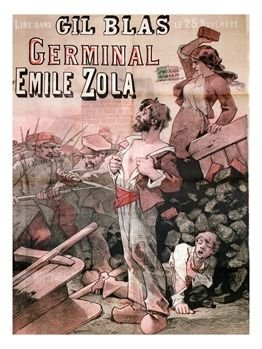Germinal (novel)


Germinal (1885) is the thirteenth novel of the twenty volumes that Émile Zola wrote within the series Les Rougon-Macquart. The novel is a harsh and realistic story about a miners' strike in northern France in the 1860s. It has been published and translated in more than one hundred countries and has served to inspire five film adaptations, two television productions and a musical..
Argument
The story takes place in France, in a town where life revolves around coal mines, a place where most of the families obtain their livelihood; Each member of the families who work there becomes a virtual slave to the mine, earning miserable wages, wearing themselves out and running the risk of not returning home every moment of the day. Fed up with this situation, having included hunger and illness in their lifestyle, unwilling to continue with this “life” that, having already lost all hope, had ceased to be so, they organized to start a strike, asking for an increase that would It would allow at least a little escape from the state of hunger in which they lived.
The strike begins, everyone with a new hope, to improve their lifestyle, to do something for their families. The Maheu family along with Etienne are the leaders, and they try to make an arrangement with the bosses, but when they are denied this increase, they take action and go to the mines in the adjacent towns to prevent them from working as well, and they succeed, but they also manage to Now the police guard the mines, which are beginning to be worked by foreigners, mainly from Belgium.
By wanting to intervene again in the mine worked by new hires, the police confront them, and in the confusion they shoot when they are attacked by the strikers and one shot kills Toussiant Maheu, moral leader of the striker cause.
Seeing the moral leader lost, along with other members, the strike weakens and many think about going back to work, coupled with the fact that they no longer had money, and had already lost family members due to illness.
They return to work, with their heads bowed, due to all the unfortunate situations they had gone through, and due to these tragedies, they sabotage the mine, managing to save some, but the eldest son of the Maheus losing his life in the rescue, Maheude was now left with her son in her arms and her grandfather, who would later lose his temper and kill the daughter of one of the bosses.
At the end of the story they work again, hope is lost, but the only thing that remains is the seed that will one day germinate; They sowed it with their courage and their blood, and someday, in search of the sun and freedom, it will germinate.
Film adaptations
- 1903: Germinal from Ferdinand Zecca, 15 minutes short.
- 1905: Au pays noirby Lucien Nonguet
- 1912: Au pays des ténèbres of Victorin Jasset
- 1913: Germinal d'Albert Capellani
- 1963: Germinal, d'Yves Allégret, Jean Sorel, Berthe Granval, Claude Brasseur and Bernard Blier
- 1993: GerminalClaude Berri, with Renaud Séchan, Miou-Miou, Gérard Depardieu, Judith Henry and Jean Carmet
- 2021: Germinal, television series produced by France Télévisions, Salto (VOD platform) and the Italian Radiotelevisione.
Contenido relacionado
The other shore (book)
Oskar Kokoschka
Erec and Enide